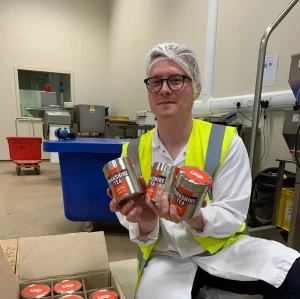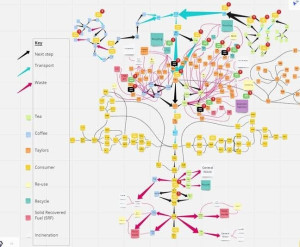Sebastian Robson completed the School of System Change Basecamp programme in 2020. Here he shares how the course helped him to implement a circular economy initiative for Yorkshire Tea, one of the biggest tea brands in the UK.
Tell us about your background.
I’m from a little village in Bavaria, Germany, which is about one hour away from Munich. After finishing my BA Business Psychology in Munich, I decided to do a MSc Global Marketing in York. After my graduation, I secured a graduate trainee role within Taylors of Harrogate (also known for Yorkshire Tea), where I work within the Innovation department. In my latest project, I was responsible for launching a test & learn Loop trial for Yorkshire Tea.

What brought you to the School of System Change?
I had just finished University, joined Taylors of Harrogate as a graduate trainee and managed to get on the Basecamp course because I was focusing on implementing a circular economy initiative within the business, looking at reuse models. The plan was to use the Basecamp experience to figure out where the opportunity is for Taylors in reuse.
What are your reflections on the Basecamp experience?
The in-person workshop we had as a group in Brussels was one of the most amazing privileges that shaped me the most. I’ve started noticing things around me in a different way. The session on biomimicry was amazing, what you can see in a shell if you really notice. It inspired me to pay more attention to living organisms. Not constantly, otherwise your mind would be on fire, but I’m being more mindful about living systems and ways of seeing abundance in the world — ways of thinking that I didn’t know existed before Basecamp.
I also learnt a lot about complex system diagnosis. I looked at our tea and coffee system, which was really difficult to begin with. Where do you start? Where do you draw the boundaries around the system? It was mind-blowing to try to wrap your head around the complexity, so at one point we had to draw the line around waste, to give us a clearer boundary to work with. We used Miro (see below) to map the waste system for tea and coffee. We realised there was a huge problem and lack of circularity around packaging. This helped us shape a proposal for our leadership team — these are the issues to think about in the future and these are the critical success factors. Taylors had previously been primarily focused on recycling, but mapping the system showed how linear a solution this really is, and it challenged us to be more ambitious in our future circularity targets, and ultimately led us to adopt a pilot of Loop, a reuse model for our Yorkshire Tea.

Our fieldwork project also got me out of my day-to-day life and challenged me to think differently. Our group focused on a Traveller community in Leeds and why they were being excluded from education and society. We used the Iceberg model to help us understand the underlying systems and processes at play; the power dynamics and hierarchies involved. Furthermore, we’ve learnt a lot about system diagnosis through that process in a way that was very different to looking at the tea and coffee system.
How has the work you did on Basecamp influenced your organisation? What have you learnt about implementing change?
Bringing the Loop project into Taylors has been a challenge. When you come with something new and different, people freeze in shock-mode or don’t know how to react because it requires a major system change in how we think about packaging and finance. It requires us to see packaging as an asset and not a cost, but this is just not how our traditional business model works. We faced resistance internally, so we took a top-down approach, in that we went up to the leadership team and got the green light from the top, which made it easier as we had backing from people higher up in the organisation.
Through the process since the School I’d say that there are three key things in implementing change organisationally: the importance of building resilience, fighting against business as usual, and the vital role of stakeholder engagement.
Building resilience
Initially there was a lot of disappointment when the business didn’t pick up the idea straight away. I remember saying to my manager that it felt like someone just popped my balloon, and it really took the energy out of it. But through the project I learnt how to deal with uncertainty, change and surprises, and the punches we received in the process ultimately made my balloon thicker so it’s not as easy to pop anymore! It highlighted the importance of staying passionate and motivated despite a lot of drawbacks, which I primarily did through team engagement and talking with others about the potential for impact. You really have to believe in the project, and communicate with others who have been through similar projects and remain passionate about the end goal. For me it was about achieving a circular economy.
Fighting against business as usual
This project really caused disruptive change, particularly in the finance and packaging teams, for example how we account for stock caused a lot of disruption. It goes back to how deposits work, which blew the minds of our finance department and made them think differently about how packaging could work financially. With Loop, it’s a consignment model — we give Loop stock, they don’t pay for it, they sell it and then they pay for it. We move from single use packaging that costs as little as a few pence, to stainless steel containers that cost a factor of magnitude more. You only recover the costs over multiple reuse cycles, but that packaging becomes an asset and not a cost. We launched a really small-scale pilot, but the attention it got was disproportionate to the scale, and we had to jump through all the hoops of a full launch process, with a P&L etc. We had to give a lot of justification to get things done, and teach a way of thinking circularly that could help bring people along with us. I did the Ellen MacArthur Foundation course after Basecamp, and that really helped me with some of the know-how to justify and teach about circularity within the business.
Stakeholder engagement
Lastly I’d say the process of stakeholder engagement is crucial. We don’t work like robots; the role of emotions is huge, so how are you working with that? One example was pitching the idea to our Senior Directors and asking them what they want to be able to say when their children ask them what they did about climate change. This helped a lot, to build that personal connection when you need approval and budget. That top down approach was vital in getting backing for a change of design and in responding to the inertia of business as usual.
We’ve done our job with Loop in the innovation team now, we’ve tested it and learnt from it and have passed on our recommendations for how we could scale it up and iterate it so it could work better. I hope and think it will scale up — and that we join a new exclusive initiative that is emerging. The demand is there, and we just have to radically change — we can’t just leave this for the consumer to deal with anymore. Either way it’s been an amazing learning experience and taught me a lot about social acupuncture — where to put a bit of pressure to unlock change, and often in ways that don’t hurt too much! I’ve noticed other colleagues are pushing more circular solutions now, and the business is proud of the leadership we’ve demonstrated.
Is there anything else you want to share about your experience?
I had a really good time with Basecamp — feel privileged to have done an in-person session with how things have changed with COVID-19. Nonetheless, at first I was intimidated because I felt I was young and inexperienced, when so many of the other people held senior roles within businesses. I felt out of place to begin with, but I also had an open mind like a sponge. If there’s something I would share it’s really trying not to feel intimidated by being less senior, and to actually embrace it as an advantage. That really helped me in the end.





